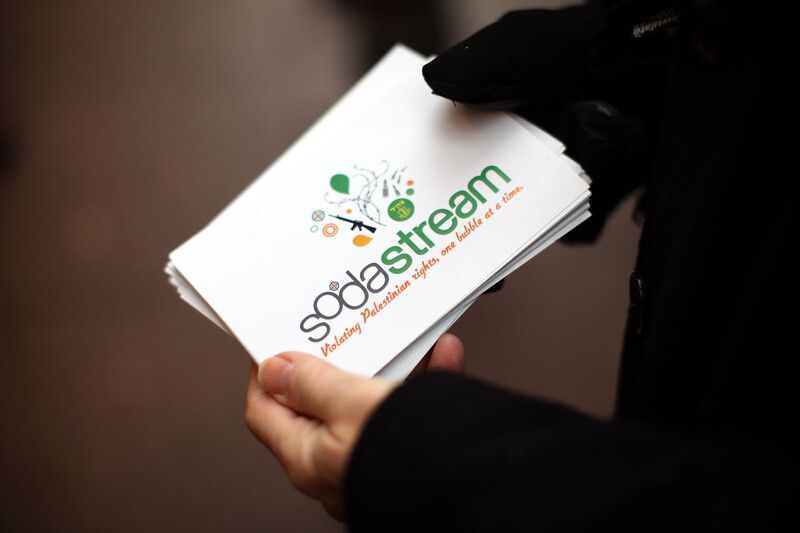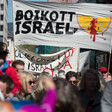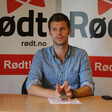9 March 2016

SodaStream has tried to fight back against a global boycott campaign by portraying itself as a chamption of Palestinian workers.
ActiveStillsOver recent weeks, SodaStream CEO Daniel Birnbaum has been repeating the accusation that the boycott, divestment and sanctions (BDS) movement was costing Palestinian workers their jobs.
But after being forced to fire 74 workers whose permits were denied, he is now focusing his anger on the Israeli government.
Under the headline, “Idiotic Israeli red tape, not BDS, got Palestinians fired,” the Times of Israel reported that Birnbaum is “furious” with the Israeli government.
Reports from several sources suggest that the denial of permits had little to do with “security,” but resulted from the prioritization of Israeli workers by the current right-wing government.
“Apparently my 74 employees are being sacrificed to make a claim that BDS is hurting the Palestinians,” Birnbaum told The National.
“But I don’t believe in human sacrifice. I will not allow this immoral act to go unchallenged,” he added. “This act of preventing the Palestinians coming to their jobs is an act of the Israeli government, it’s not an act of BDS. I’m ashamed and still hope someone in the government, especially the prime minister, will realize this injustice and fix it. You don’t throw people into the street to make a political point.”
The workers needed new permits in order to continue working for SodaStream after it shifted operations from the West Bank industrial settlement Mishor Adumim to a facility in the Naqab (Negev) desert in the south of present-day Israel.
The move came in the wake of boycott campaigns that intensified following a Super Bowl ad featuring Hollywood star Scarlett Johansson.
Her endorsement of a settlement product ultimately resulted in her resigning as a goodwill ambassador for the anti-poverty group Oxfam, which maintained its opposition “to all trade from Israeli settlements, which are illegal under international law.”
Permit regime
Birnbaum’s shock at the arbitrary denial of permits might seem naive to those familiar with Israel’s Kafkaesque permit regime. After all, Palestinians are required to have permits to work in settlements as well.
According to COGAT, the bureaucratic arm of Israel’s military occupation regime, 27,000 Palestinians have permits to work in West Bank settlements while 58,000 are allowed to work in present-day Israel.
For the latter, that means early morning waits in crushing queues at checkpoints where workers are routinely subjected to dehumanizing treatment.
One SodaStream employee described leaving home in the West Bank at 4:30am and returning at 7pm.
A landmark report by Human Rights Watch in January detailed the ways dependence on these permits makes Palestinian workers vulnerable to abuse.
Israeli government agencies provide virtually no oversight or labor protection for Palestinian workers, despite a ruling by the Israeli high court that Israeli labor laws should cover them as well.
As a result, it is up to the workers to demand their own rights. But most fear to do so because of employer retaliation, loss of permits and blacklisting.
“[T]he discriminatory environment and regulatory vacuum in which they operate tempers considerably the settlement employers’ and supporters’ claims that these businesses benefit Palestinians by providing them with jobs,” Human Rights Watch states. “Such claims also ignore how settlement businesses entrench and benefit from a discriminatory and unlawful system that harms the Palestinian economy and livelihoods.”
Human Rights Watch concluded that there is no way for companies to do any business in or with settlements without contributing to Israel’s gross violations of Palestinian human rights.
Positive investment?
Birnbaum told the Times of Israel that he is not giving up on his former employees and plans to help Palestinians set up their own industry. “If the Israeli government won’t let Palestinians come to their jobs here, I will bring the jobs to the Palestinians,” he said.
His comments echo the sentiments of many BDS critics who say that rather than divest from Israeli businesses, those truly concerned for Palestinians should instead invest in the Palestinian economy.
What this sentiment ignores is that the single greatest obstacle to the Palestinian economy is Israel’s ongoing occupation and colonization of Palestinian land.
This includes, as Human Rights Watch notes, policies that take Palestinian land and resources and restrict construction, trade and movement.
While settlements enjoy financial incentives, construction permits and the ability to extract natural resources from Palestinian land, the Israeli government denies those same rights to virtually all Palestinian enterprises under their control.
As a result, according to World Bank estimates, Israeli restrictions cost the Palestinian economy $3.4 billion every year, about one-third of Palestinian GDP.
“Investment in Palestine — without divestment from the Israeli occupation — only continues to underwrite the status quo of military occupation,” writes Palestinian American businessman Sam Bahour, who has decades of experience trying to build the Palestinian economy. “For investment to be successful,” he states, “occupation must be dismantled and control passed to Palestinians.”
Human shields
Yet despite such calls from within the Palestinian business community, BDS critics continue to use Palestinian workers as human shields against economic activism.
Similar crocodile tears were shed on behalf of South African workers when Archbishop Desmond Tutu called for sanctions in his country during the struggle against apartheid.
Palestinian civil society has overwhelmingly endorsed the campaign against SodaStream, including Palestinian trade unions.
Writing just days before Birnbaum’s latest comments, Times of Israel editor David Horovitz sarcastically congratulated the BDS movement for putting SodaStream’s Palestinian workers out of their jobs.
He also parroted the company’s claims that Jewish and Palestinian workers were treated equally — or at least that “pay and benefits were identical for workers in comparable jobs, irrespective of their citizenship and ethnicity.”
What the “comparable jobs” caveat conveniently ignores is the fact The Electronic Intifada reported three years ago: that Palestinians were relegated almost exclusively to “hand work” — along with a handful of African Jewish immigrants or “Black Jews.”
Only a tiny fraction of the Palestinian employees held higher-level positions and there were none at all in management.
Other reports cite complaints by SodaStream workers common to many settlement businesses, including racist discrimination and that workers fear speaking out because they can easily be fired.
Questionable credibility
Yet Birnbaum has been successful in selling mainstream media on SodaStream’s myth of equal treatment and harmony.
Both the Associated Press and the Times of Israel quote the same Palestinian worker, Muhammad Jaradat, who calls SodaStream “a factory of peace” where “everyone was equal.”
His words sound strikingly similar to Birnbaum’s assertions in The Jerusalem Post that his company is “an incredible island of peace.”
The fact that a Palestinian worker is using the same words as his Israeli employer should come as no surprise as employees used in SodaStream’s public relations campaigns are coached on what to say and how to say it.
The bottom line, according to Human Rights Watch, is that “settlement businesses contribute to Israel’s international law violations regardless of how they treat their employees.”
As for Birnbaum’s own credibility, consider that last month he claimed that his relationships with his West Bank workers were so important that he would close his new factory in protest if their permits were not renewed.
“If they’re not staying here, then I’m not staying here. If I have to shut down this factory, I’ll shut it down,” he said.
It would seem the Israeli government has called his bluff.




